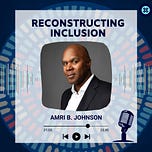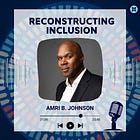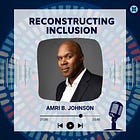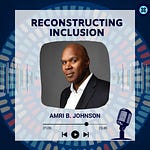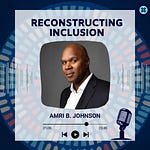Welcome to the Reconstructing Inclusion Podcast!
As I wrap up season two, I find myself in a place I never expected to be when I started this work almost 25 years ago. And after deep conversations with some of the most challenging thinkers in our space, I've come to believe we need to fundamentally reconstruct how we approach this work.
This season pushed me beyond comfortable assumptions. From Dr. Jonathan Ashong-Lamptey's evidence-based inclusion framework to Dr. Sheena Michelle Mason's revolutionary "raceless anti-racist" approach, each conversation challenged me to question what I thought I knew.
The central revelation that emerged from these conversations is both controversial and compelling: the current paradigm of focusing on group (heavily focused on racialized) differences may be fundamentally counterproductive to creating belonging and mattering. As I've reflected on this challenging year, I've realized that much of what we're seeing is a natural market correction, but the path forward requires moving from asking "what people are" to understanding "who they are."
This isn't about ignoring history or denying the reality of racism—it's about building a more effective foundation for human connection and organizational transformation. Let me share what I've learned and how it's evolved my approach to this work.
The Crisis of Racialization: Why The Current Approach Isn't Working
The most striking realization throughout season two was recognizing that racialization—the process of organizing society around racial categories—may be at the heart of DEI's current struggles. This isn't comfortable for me to admit, having been socialized, like most people in the United States/Anglosphere, with racialized notions predominating our sociology, but it's becoming increasingly undeniable for me that it is not leading to progress.
"The focus that we've had for the past few years, since I'd say after Floyd on anti-racism in the Kendi and DiAngelo sense, wasn't resonating with me for quite some time. In fact, I engaged organizations as they were in their anti-racism phases. In the binary Kendian sense, most of them were taking, it didn't work for me." [00:07:00]
This moment of honesty captures a profound shift in my thinking. My discomfort wasn't just philosophical—it was practical. I was watching organizations implement binary anti-racist frameworks that created dissonance rather than solidarity, fault-finding rather than problem-solving. The approach that promised to dismantle racism was often reinforcing the very racial thinking that underlies it.
My conversation with Dr. Sheena Michelle Mason proved particularly transformative for my thinking. Mason's work on "raceless anti-racism" offers a compelling alternative: ending racism by ending race itself. This approach doesn't ignore historical injustices but recognizes that continuing to organize society around racial categories perpetuates the foundation upon which racism stands.
I had to confront this reality head-on:
"It's happened in a significant way by people racialized as black and racialized as white and otherwise. I'm not saying that the anti-DEI train was hopped on in good faith with a desire to see a different way forward... But there is no doubt that racialization is a key component of the vitriol that we've seen." [00:08:00]
Beyond Difference: How Fred Falker Energized My Perspective on Inclusion
One of the most paradigm-shifting conversations I had this season was with Fred Falker, whose TEDx Talk on moving from "difference to distance" challenged my fundamental assumptions about diversity work. Fred's insight cuts to the core of why traditional DEI approaches often fail to create genuine belonging.
"The lines of difference we draw can be acknowledged and even respected Fred says, but to attach to them as real doesn't serve us and hasn't served the current DEI paradigm." [00:04:00]
This represents a fundamental shift from cataloging what makes people different to understanding how we can reduce the distance between human experiences. Fred's work, informed by decades in the field, suggests that focusing on identity categories creates boxes that aren't real but have real consequences for human connection.
I found this framework particularly powerful because it addressed the cognitive dissonance I was feeling but rarely voiced. How most practices diversity and inclusion has been anchored so deeply on difference-based approaches that questioning them could feel like abandoning the mission itself. But as I discovered through these conversations, "most of us have anchored on the paradigm of difference so intently that breaking from it even conceptually causes cognitive dissonance." [00:05:00]
The distance framework offers a way forward that honors human complexity without reducing people to categories. It's about creating conditions where people can show up as full humans rather than representatives of demographic groups. This shift from "what people are" to "who they are" opens up possibilities for connection that difference-focused approaches often foreclose.
The Manipulative Underspecification Trap
I learned a fascinating concept from philosopher Jonny Thomson called, "manipulative underspecification"—saying enough about something to trigger reactions without providing specific meaning. This concept illuminated much of the current discourse around DEI and its opponents.
"It means to say enough about something, but say nothing at the same time and let people fill in the blanks. 'Make America Great Again' is one of those phrases that reeks of manipulative underspecification. Make it great for whom, how, and compared to what? What does it mean? That's the point." [00:14:00]
This insight revealed how both DEI advocates and opponents have fallen into vague rhetoric that generates heat without light. Anti-DEI activists reference "critical race theory" and "woke ideology" without specific critiques, while I've watched DEI practitioners respond with equally vague defenses of "social justice" and "equity" without clear definitions.
The parallel to the Chicken Little story became clear to me: both sides are running around claiming the sky is falling without examining what's actually happening or offering concrete solutions.
"DEI is 'under attack' was the sky falling moment for DEI practitioners. And we reacted in a way very similar to what bad faith actors hoped we would. We went directly opposite and gave an equal energy to something that only created contention, not transformation." [00:15:00]
This dynamic has created a discourse where genuine dialogue becomes impossible because neither side is willing to engage with specifics. The solution isn't to abandon the conversation but to insist on clarity, evidence, and good faith engagement with both the strengths and limitations of current approaches.
Skin in the Game: The Integrity Test for Inclusion Work
Perhaps the most personally revealing section of my reflection focused on what I call "skin in the game"—having something to lose when you're wrong. Drawing from Nassim Taleb's work, this concept provides a crucial test for anyone involved in inclusion work, including myself.
"I have almost 25 years of skin in this game. Skin in the game is about having something to lose when you're wrong. In the case of DEI, many of us with consulting firms, even those in OD who don't formally do inclusion and diversity work have been impacted, especially those of us where inclusion and diversity is our primary source of revenue." [00:23:00]
This vulnerability—both financial and professional—creates a powerful incentive for honesty about what's working and what isn't. My willingness to evolve my thinking, even when it challenges my previous approaches, demonstrates what "soul in the game" looks like: caring about outcomes even when it's professionally uncomfortable.
The Hammurabi's Code reference provides a sobering reminder of what real accountability looks like. While we're not suggesting life-or-death consequences for failed DEI initiatives, the principle remains: those building systems should bear responsibility for their outcomes. This accountability extends beyond immediate results to long-term impacts on organizational culture and human relationships.
"Someone with soul in the game continues to care about outcomes even when they're not being directly monitored or when the immediate incentives are removed." [00:25:00]
This internal commitment to excellence, rather than external compliance with expectations, may be what separates transformative inclusion work from performative diversity theater.
Key Takeaways
The paradigm shift from difference to distance offers a more promising foundation for inclusion work. Rather than cataloging what makes people different, I'm even more focused now on reducing the distance between human experiences and creating conditions for genuine connection and community.
Racialization is counterproductive to anti-racism goals. The evidence I've encountered suggests that organizing society around racial categories perpetuates the foundation upon which racism stands, making "raceless anti-racism" worth necessary consideration (even when it occurs as cognitively dissonant to do so).
Manipulative underspecification has poisoned the DEI discourse on all sides. Both advocates and opponents use vague rhetoric that generates reaction without genuine dialogue, making specific, evidence-based conversations essential.
Skin in the game creates the accountability necessary for genuine progress. Those of us involved in inclusion work must have something to lose when approaches fail, creating incentives for honesty about what works and what doesn't.
This current crisis represents a market correction, not a fundamental rejection of inclusion. Organizations still need cultures where everyone can thrive; the question is what approaches will actually achieve that goal.
Justice belongs in organizations, but not justice for particular identity groups. I've come to believe that universal principles of fairness and dignity serve inclusion better than group-specific advocacy that can create division.
The Reconstruction of Inclusion Continues
Season three will deepen these explorations with panel discussions on race abolitionism, examinations of the principles underlying inclusion work, and conversations about relational fitness in an AI-amalgamated workplace. My goal isn't to tear down everything that came before but to build on solid foundations while having the courage to abandon approaches that aren't serving human flourishing.
The sky isn't falling on inclusion work—it's evolving. The question is whether we practitioners will have the courage to evolve with it, moving beyond comfortable assumptions toward approaches that actually create the belonging and mattering we claim to champion.


